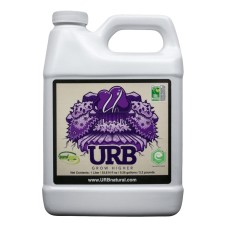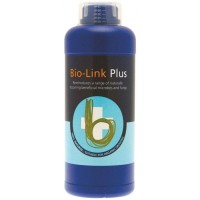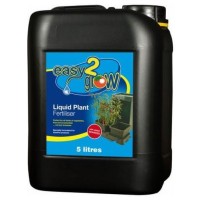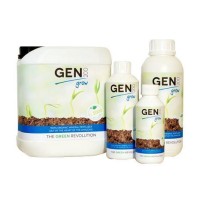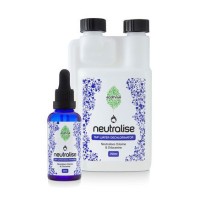URB Natural Beneficial Microbes by URB Natural
URB Natural Beneficial Microbes by URB Natural
Accessories / Add-ons
| Image | Product Name | Action |

|
Ecothrive Neutralise - Tap water dechlorinator |
Add to Cart |
Product Options
-
£20.95
Out Of Stock
University Tested & Grower Approved - Proven to Increase Yields While Reducing Fertilizer Inputs
SAFE and EFFECTIVE on all plant life, in all growing mediums and systems. URB Natural is a stimulative poly-microbial inoculant with multiple, complementary functions that can be noticed working in all phases of the plant life cycle. SEED to FINAL FLUSH.
While the idea of microbial inoculants for stimulating crop production is not new, careful and deliberate design of a formulation to contain multiple, naturally occurring phylogenetic groups of organisms with complementary functionalities and noticeable effects from seed to final flush, with little or no need for added chemical fertilizers and pesticides is innovative.
URB Sciences believes the design of the URB product line is better than any of its competitors since it takes a holistic, synergistic approach to boosting crop yields and decreasing inputs in a sustainable manner. The documented benefits achieved with URB are clearly better than any known competitor.
All liquid formulations are Certified Organic
Our precision engineered microbial formulation is suspended in a triple screened 12% humic acid carrier, stabilized at a balanced pH of 7.0, which allows it to effectively work in all mediums and growing systems.These humates act as a carbon food source for the microbial formulation, are high in organic matter and contain micronutrients, such as calcium, magnesium, zinc and manganese.
URB Natural Contains the Following Species:
Bacillus subtilis - or B. sub, is a key beneficial plant bacteria. B. subtilis plays a role in replenishing soil nutrients through both the carbon cycle and the nitrogen cycle. To aid thecarbon cycle B. subtilis degrades thatch, pectin, cellulose and other organic materials. B. subtilis forms biofilms which are dense populations of organisms. These biofilms provides the plants with preventive colonization, sometimes called competitive inhibition. While beyond the scope of this post, preventative colonization essentially prohibits other microorganisms from forming colonies around the plant roots.
Bacillus megaterium - Another key beneficial plant bacteria is Bacillus megaterium. In addition to some of the benefits conferred by B. subtilis, B. megaterium is known to be a phosphate solubilizing bacteria (PSB). PSBs have several important benefits:
- They make phosphorus more available to the plant
- Reduce the need for traditional fertilizer applications
- Increases uptake of water. Increases disease and drought resistance.
- Reduce Environmental problems downstream
- Promote sustainable growing practices.
Bacillus licheniformis - is a spore-forming soil organism that contributes to nutrient cycling and has antifungal activity. There is current research on B. licheniformis (strain SB3086) and its effects as a microbial fungicide.t is a gram-positive, mesophilic bacterium. It can exist in a dormant spore form to resist harsh environments, or in a vegetative state when conditions are good. High capacity of secretion of the alkaline serine protease has made B. licheniformis one of the most important bacteria in industrial enzyme production.
Bacillius subtilis subsp. spiziizeni - Prevents & controls Root Rot. Plant growth promoting rhizobacterium shown to synthesize antifungal peptides. This ability has led to the use of B. subtilis in biocontrol. Also proven to increase crop yields, although it has not been shown whether this is because it enhances plant growth, or inhibits disease growth. They are also capable at growing at pH values, temperatures, and salt concentrations where few other organisms can survive.
Bacillus pumilus - participates in a wide range of symbiotic relationships. B. pumilus can function as a plant growth promoting rhizobacteria within the rhizosphere. Additionally, B. pumilus is thought to function as a plant growth promoting endophyte.
Trichoderma harzianum strain T-22 - Is one of the most effective strains of this fungus It is able to colonize the roots of most plant species across a wide range of soil types. This fungus is used as a biocontrol agent during crop production, and for the improvement of the rooting and acclimatization phases in plants. Using Trichoderma harzianum strain T-22 during the rooting phase results in greater shoot lengths, as well as increased numbers of leaves, roots, and stem diameters. T-22 promoted plant growth by both indirect and direct mechanisms, promotes enhanced root growth, root development, and root function by means of hormonal and biochemical signals. Highly effective on seed germination when doing undiluted URB soaks.
Applications of URB Natural:
Hydroponics, soilless, or soil based container growing applications
Application Rates/Dosage of URB Natural:
Hydroponic / Soilless: Apply URB Natural at a ratio of 5-10ml per gallon and feed once weekly, URB & water only.
Hydroponic / Soilless Optional Maintenance Application: 1-2ml per gallon with every watering. URB Natural can be simultaneously mixed with fertilizer prior to application.
Hydroponic / Soilless Fertilizer Reduction: a 15-25% nutrient/fertilizer reduction can be incorporated.
Soil: Apply URB Natural at a ratio of 10-15ml per gallon and feed once weekly, URB & water only.
Soil Optional Maintenance Application: 1-2ml per gallon with every watering. URB Natural can be simultaneously mixed with fertilizer prior to application.
Soil Nutrient/Fertilizer Reduction: A 50% reduction of NPK fertilizer can be incorporated in fresh soil for the first 10 weeks of Vegetative Growth. A 15-35% nutrient/fertilizer reduction can be incorporated through the flower cycle.
Foliar Application: Dilute 10mL/gal and spray plant after starter roots have been established. Best after initial transplant. Apply once a week during entire vegetative growth stage. *Do not apply foliar application directly onto flower sites during flowering stage.
Undiluted Seed Soak: Pour a small amount of URB into a spoon or bottle cap. Set a timer for 45 minutes. Drop your seeds into the undiluted URB and start the timer. Pull seeds out of the solution at 45 minutes and proceed with normal germination techniques.
Diluted Seed Soak: Get an organic, unbleached cotton swap and a 8oz glass of clean water. Dip the cotton swab into a bottle of undiluted URB Natural. Dip the URB Natural saturated cotton swab into the 8 oz. glass of water. Repeat until the majority of the URB Natural liquid has transferred to the 8oz solution. Place seeds into the mixed solution. Two methods can be used from this point. You can immediately pour the solution and the seeds into a paper towel, proceed with standard paper towel germination methods. Alternatively, you can let the seeds soak in the solution until tap roots become visible.
Aeroponic Propagation: Apply URB Natural at a ratio of 2.5ml per gallon of water into the aeroponic reservoir at initial fill and with each reservoir change.
Rockwool / Plug Propagation: Apply URB Natural at a ratio of 2.5ml per gallon of water. Soak the cubes/plugs in the mixed solution for 12-24 hours prior to use. Use 1-2ml per gallon of water each time you water the clone trays.
Tags: URB, Natural, Beneficial, Microbes
Q & A
Be the first to ask a question.

